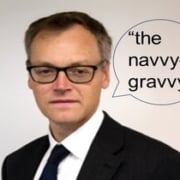Making messages meaningful – the art of getting quoted
One of the core principles at The Media Coach is for media interviewees to wrap their key messages in dynamic language, thereby making them more quotable. This is what we often refer to as ‘sizzle’ in our Media Training and Message Building.
Broadly speaking, as long as the words you use stand out, they should help the journalist sit up and pay attention to what you say, therefore become more likely to be drawn towards your line of argument, more likely to use them, and for those words to stick in the minds of the audience (listeners, viewers, readers).
But – and it seems strange we should have to say this – the words you choose have to be used widely enough in everyday speech for the meaning you are trying to convey to be clear.
Well, obviously, you say.
Yes, you’d think.
However, an exchange took place on the Radio 4 ‘Today’ programme last week, where the interviewee had clearly not understood this most basic of ideas.

Michael Tomlinson, Conservative MP
He’s Michael Tomlinson, Conservative MP for Mid Dorset and North Poole, as well as Minister of State for
Countering Illegal Migration. He was discussing the Rwanda bill and outlining what he said were minor differences between Conservatives over the issue (although, it has to be said, enough difference for two senior Tories to quit) as compared to the gulf he said existed between the Conservatives and Labour.
These are the words he used:
“Perhaps the difference, the navvy-gravvy, the inch of difference between us on the Conservative benches – in contrast to the miles of difference there are between us and the Labour Party – the navvy-gravvy of difference is of emphasis, of nuance.”
I’m sorry, the what, exactly?
The “navvy-gravvy”?
What on earth…?
If you’re none the wiser, you’re in good company.
Radio 4 listeners got in touch with the programme asking what it meant too, saying they had no luck when searching on Google.
So, the programme team tracked down lexicographer Susie Dent (a regular contributor to the Channel 4 programme ‘Countdown’ and ‘Cats does Countdown’), who admitted she also hadn’t come across it before.
She had tried consulting the Oxford English Dictionary database (amongst others), with no joy. But investigating further, and with the help of the Urban Dictionary (what she described as “the voice of the people, for good or bad”), she discovered: “essentially the navvy-gravvy, within the Royal Dockyards, apparently, it is a tiny, tiny difference – used when fitting components, for example, which you need to customise, you might need to shave off a tiny amount… to make something fit.”
So, it’s not even a phrase used by the “youth” (as Husain rather quaintly put it when interviewing Susie Dent), but instead it’s tribal group slang – (once?) used by workers at the Royal Dockyard.
Even Tomlinson would have to agree, that’s a vanishingly small group.
This is not to say the phrase is without merit. The “Navvy” is the Navy, obviously. And the “gravvy” is a repeated sound which seems to be there for rhyming effect – such as “easy-peasy”, “namby-pamby” and “helter-skelter” – or what linguists call a ‘reduplicative compound’.
If I was being picky (or ‘picky-wicky’), I would say that it would have been better for Tomlinson to align his contrasting pair more closely. As he is claiming an “inch of difference” (singular) between individual Conservatives on the policy, the effect was spoilt by claiming “miles of difference” (plural) between Conservatives and Labour. Contrasting pairs work better when the two phrases are as similar as possible, only differing in the specific point they are trying to make.
But this doesn’t get away from the fact that adding “navvy-gravvy” into the mix confuses everybody.
Any Conservative Party PRs celebrating the fact that Tomlinson’s comment received so much ‘traction’ are misguided. All anyone was talking about was the phrase itself, not the context in which it was used. They are talking about the way in which he expressed a point, not the point he was trying to make. In effect, the original interview was hijacked by the use of a peculiar term that (almost) nobody ever uses, and (almost) nobody understands.
After the interview, presenter Mishal Husain admitted she didn’t know what the phrase meant either, saying – perfectly reasonably – “there were other things to ask him that were more pertinent to the subject”.
In other words, she – like the listening public – didn’t understand it, didn’t want to waste time on it, so ignored it.
Almost as if her interviewee hadn’t bothered saying it at all.
Image from: https://www.gov.uk/government/people/michael-tomlinson, OGL 3, https://commons.wikimedia.org/w/index.php?curid=144203208
For more on how to use interesting words to get quoted and repeated, here is a previous blog from Lindsay Williams on the subject.
- Introducing the ‘Act Out’: - October 29, 2024
- Politics as Entertainment - July 2, 2024
- All Presenters Need a Critical Friend - April 23, 2024




Leave a Reply
Want to join the discussion?Feel free to contribute!